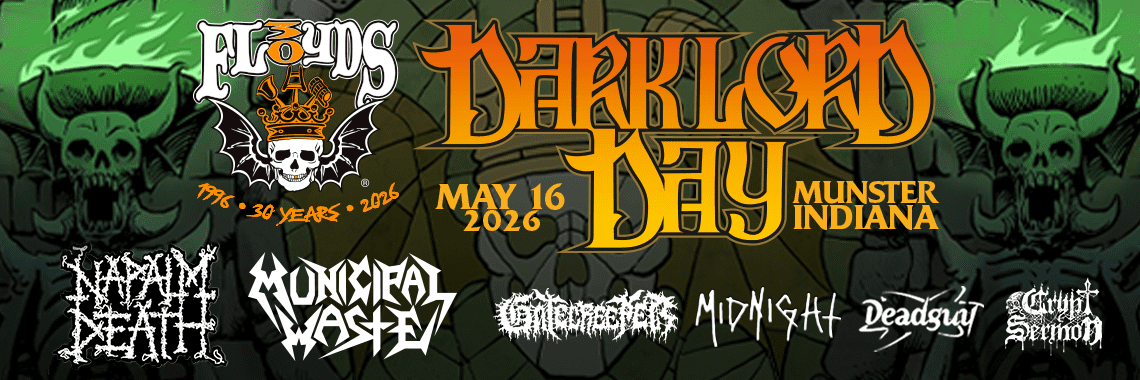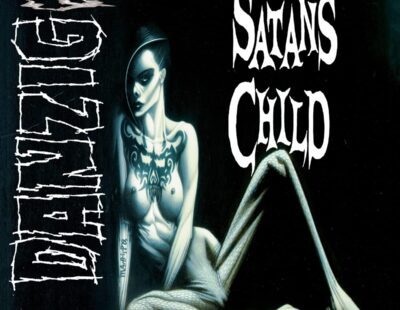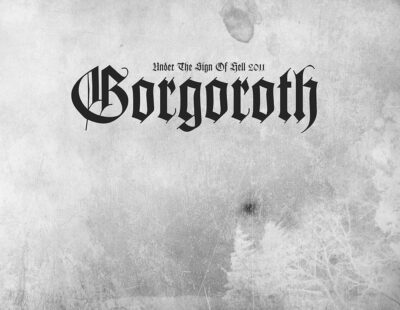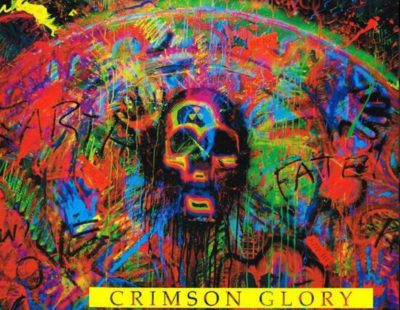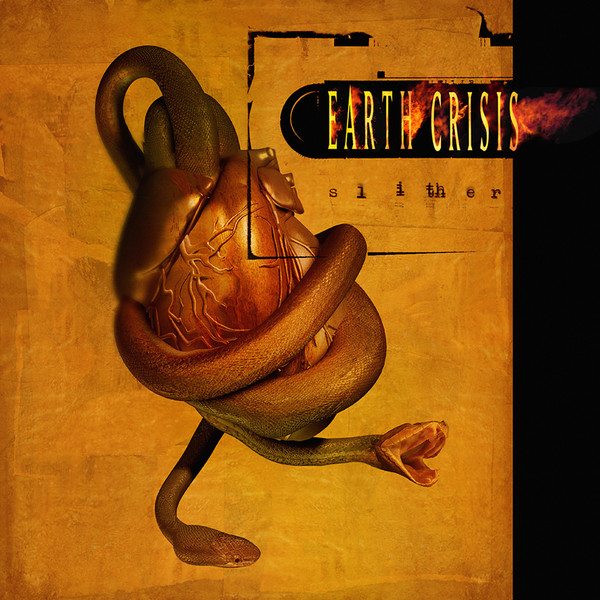
Almost every band has that album: you know, the critically and/or commercially reviled dud in an otherwise passable-to-radical back catalog. Occasionally, a Decibelstaffer or special guest will take to the Decibelsite to bitch and moan at length as to why everybody’s full of shit and said dud is, in fact, The Shit. This time around, Shawn Macomber defends Earth Crisis’ Slither.Mustering up a defense of Slither is a strange, somewhat lonely business — never mind the fool’s errand of hunting for freethinkers in the diehard Earth Crisis fanbase to back me up on this one,it’s not even clear how eager the band itself would be to help man the barricades against critics of its much-maligned fourth full-length. “In hindsight, I don’t think it was a good direction for the band, but we’re all pretty proud of the record and that we did something outside of our comfort zone,” guitarist Scott Crouse told Exclaim! in 2009 –an endorsement that feels akin to something John Ritter might sheepishly say while dragging Junior back to adoption agent Gilbert Gottfried in a deleted Problem Child scene. “So, yeah…nice kid, cool bringing him into our home for a bit, but, in hindsight,not a great fit for the family. See y’all again, like, never.” The band broke up shortly after Slither dropped and did not release another album of new material until 2009’s To the Death, a comeback effort which does not give the aesthetic or sound of Slither so much as a perfunctory, up in the same club, cool-to-see-you-but-don’t-talk-to-me nod.The odd thing about the enduring perception of Slither, though,is that for all the fallout over the band incorporating clean vocals at an admittedly poorly timed nu-moment — a PunkNews reviewer confided that his friends had dubbed the record Limp Crisisnit (!) — the record is worth reevaluating mostly because it represented an exceedingly welcome return to Earth Crisis’ comfort zone.Whatever one thinks of the subversive asceticism Earth Crisis made briefly, astonishingly popular during the second half of the 1990s, from a purely sonic standpoint, the band’s landmark 1996 sophomore full-length Gomorrah’s Season Ends is a innovative, off-kilter, unpredictable extreme music masterpiece: It really should be ranked among the best heavy records of its era and considered one of the greatest metallic hardcore records, period — and, truth be told, probably would be if it were not so aggressive in its challenge to those ingrained social mores and conveniences that the mainstream culture at-large does not want to deal with the implications of exploring too deeply.Do yourself a favor and revisit the entire record, but if you want a condensed primer in the freaky gamut the record covers — experiencing one of the top five breakdowns of 90s hardcore/metal along the way –hit “Constrict” up from around the 2:20 mark:
And while we’re at it, think about how amazing it must’ve been to see Coal Chamber and Powerman 5000 fans getting walloped during the inaugural Ozzfest back in ’96 by the one-two punch of a Neurosis set and performances like this:
Alas, in the wake of Gomorrah Earth Crisis faced an Identity Crisis familiar to many bands that — to paraphrase Henry Miller — raise a sound to apotheosis:Like post-Arise Sepultura,post-Heartwork Carcass, post-SeasonsSlayer, achieving a degree of perfection left Earth Crisis looking like Dustin Hoffman at the end of The Graduate:
You got exactly what you’ve been chasing after — now what?Amidst this, Earth Crisis parted ways with guitarist Kris Wiechmann, brought bassist Ian “Bulldog” Edwards brother Erick into the fold, and — ironically, for a band that just jumped from Victory to Roadrunner — released the stripped down, simplified 1998 album Breed the Killers, which, while not completely eschewing the metallic elements of Destroy the Machines and Gomorrah, is definitely more of a spiritual successor to the tough guy, meat and potatoes post-Judge hardcore of the 1996 Path of Resistance record Who Dares Wins, a side project Buechner, Wiechmann, Crouse, and Edwards launched to keep their militancy phasers set to stun while Earth Crisis drummer Dennis Merrick recuperated from a van accident.Breed has some great moments — the vivifying “Contain, control, to dominate. Contain, control, exterminate” chant closing out album opener “End Begins” comes to mind — and Rob Flynn, mere months out from his own Machine Head heresy via the Ross Robinson-produced The Burning Red, guests on “One Against All.” Overall, however, it is too relentlessly monotone to compete with its more dynamic predecessors and two years later Earth Crisis resurfaced back on Victory for Slither.Now, I don’t believe Slitheris the most fully realized evolutionary successor to Gomorrah— that, to me, would be the severely under-appreciated Freya side of the 2004 split with Hoods featuring three-fifths of Earth Crisis…
— but it nonetheless is a smart, diverse return to idiosyncratic form after Breedand almost certainly the band’s best release outside of the essential first four releases :All Out War(1992),Firestorm(1993),Destroy the Machines(1995), and Gomorrah’s Season Ends(1996).Let’s address a few of the more prevalent criticisms below:Slithermight as well have been called Dark Chocolate Starfish and the Tofu Pup Flavored Water and featured a single called “Vivisectionist on a Leash”Yeeah, Slither has some clean vocal choruses, a hippity-hop vibe on some verses, and down-tuned grooves, but that mix has much less in common with nu-metal than releases by former Roadrunner label-mates Fear Factory,Biohazard, and Madball. Actually, the record feels like the ExC of Gomorrah listening to a shit-ton of Demanufacture, Urban Discipline, and Demonstrating My Style,not any nu-metal bullshit.Dudes thought they were rock stars!
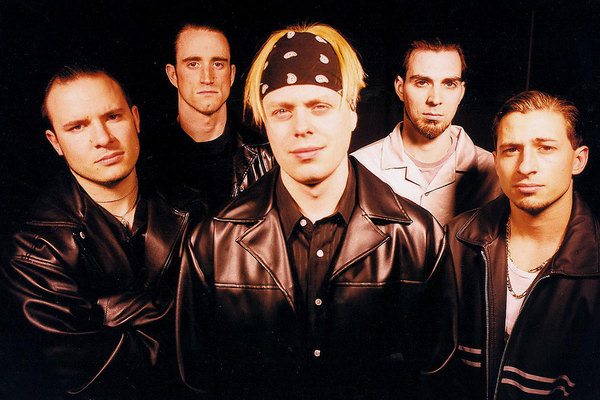
So the faux leather jacket promo photos and the autograph signing in the opening of the “Killing Brain Cells” video might seem to back this up on a superficial level, but the lyrical content on the record is as subversive and uncompromising as ever — perhaps more so. Does this opening to “Nemesis” seem like it was penned by someone who wants to head Nickleback off at the pass?:Force-fed delusions from the overseer’s hands.
Won’t swallow a doctrine that denies the truth.
Most absorb the sickness, saturated in the vile, immersed.
The weak fall quickly to blind conformity, in line.
I turned myself into a monster to fight against the monsters of the world.
I spared myself the pain they’ll suffer when it all finally comes to haunt.Yeah, well…I still don’t think you’ve answered for those fuckin’ Durst vocals!C’mon, man. In the classic pre-reunion era, Buechner constantly refined his vocal attack. It’s something he doesn’t get enough credit for. (His stellar, diverse performance on last year’s Freya record Grimis a good example of how this guy never stops growing as an artist.)And the vocal shifts between All Out War and Firestorm/Destroy the Machinesand Gomorrahall took at least a few listens to get used to — I’ve been buying death metal records since my early nineties teen years but still remember getting thrown by the pure guttural ferocity of the Gomorrahvocals. The guy-in-the-middle-of-turning-into-a-werewolf-steps-into-a-bear-trap thing had been taken about as far as possible on Breedand if you don’t run away screaming “sellout!”after the first Burton C. Bell-esque sung chorus on Slitheryou’ll find the rest of the Buechner’s performance remains pretty goddamn extreme.
Look, taste in music is a subjective thing. If Slither is “shitty” to you, that is valid. But the record is hardly the great apostasy it has been made out to be. Indeed, by my lights it’s easier to defend than the album that came before it and allthe records that came after. Take another listen without the horror of nu-metal’s reign hanging over your head and it might be more enjoyable than you suppose.

